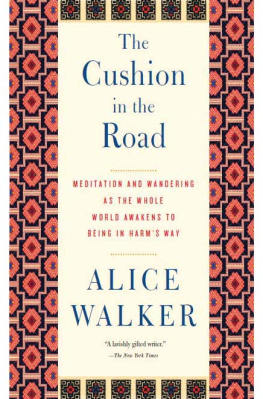Alice Walker - The Temple of My Familiar
Here you can read online Alice Walker - The Temple of My Familiar full text of the book (entire story) in english for free. Download pdf and epub, get meaning, cover and reviews about this ebook. year: 2011, publisher: Open Road, genre: Detective and thriller. Description of the work, (preface) as well as reviews are available. Best literature library LitArk.com created for fans of good reading and offers a wide selection of genres:
Romance novel
Science fiction
Adventure
Detective
Science
History
Home and family
Prose
Art
Politics
Computer
Non-fiction
Religion
Business
Children
Humor
Choose a favorite category and find really read worthwhile books. Enjoy immersion in the world of imagination, feel the emotions of the characters or learn something new for yourself, make an fascinating discovery.
- Book:The Temple of My Familiar
- Author:
- Publisher:Open Road
- Genre:
- Year:2011
- Rating:4 / 5
- Favourites:Add to favourites
- Your mark:
- 80
- 1
- 2
- 3
- 4
- 5
The Temple of My Familiar: summary, description and annotation
We offer to read an annotation, description, summary or preface (depends on what the author of the book "The Temple of My Familiar" wrote himself). If you haven't found the necessary information about the book — write in the comments, we will try to find it.
The Temple of My Familiar — read online for free the complete book (whole text) full work
Below is the text of the book, divided by pages. System saving the place of the last page read, allows you to conveniently read the book "The Temple of My Familiar" online for free, without having to search again every time where you left off. Put a bookmark, and you can go to the page where you finished reading at any time.
Font size:
Interval:
Bookmark:


To Robert, in whom the Goddess shines
If they have lied about Me, they have lied about everything.
Lissie Lyles
IN THE OLD COUNTRY in South America, Carlottas grandmother, Zed, had been a seamstress, but really more of a sewing magician. She was the creator of clothing, especially capes, made of feathers. These capes were worn by dancers and musicians and priests at traditional village festivals and had been worn for countless generations. When she was a young child, Carlottas mother, also called Zed, was sent to collect the peacock feathers used in the designs. Little Zed had stood waiting as the fat, perspiring woman who owned the peacocks held them in ashen, scratched hands and tore out the beautiful feathers one by one. It was then that Zed began to understand the peacocks mournful cry. It had puzzled her at first why a creature so beautiful (though admittedly with hideous feet) emitted a sound so like a soul in torment. Next she would visit the man who kept the parrots and cockatoos, and the painful plucking of feathers would be repeated. She then paid a visit to the old woman who specialized in found feathers and who was poorer than the others but whose face was more peaceful. This old woman thought each feather she found was a gift from the Gods, and her incomparable feathersset in the spectacular headdresses of the priestsalways added just the special flair of grace the ceremony required.
Little Zed went to school every morning wearing a neat blue-and-white uniform, her two long braids warm against the small of her back. By high school her hair was cut short, just below her ears, and she tossed it impatiently as her mother complained of the poor quality of the modern feather. No feather, these days, she explained, was permitted to mature. Each was plucked while still relatively green. Therefore the full richness she had once been capable of expressing in her creations was now lost.
Their compound consisted of two small houses, one for sleeping, another for cookingthe cooking one was never entered by Zeds father or brothersand there were avocado and mango trees and coconut palms all around. From their front yard they could see the river, where the tiny prahus used by the fishermen slipped by, like floating schools of dried vanilla-bean pods, her mother always said.
Life was so peaceful that Zed did not realize they were poor. She found this out when her father, a worker on the banana plantation they could also see from their house, became ill. At the same time, by coincidence, the traditional festivals of the village were forbidden. By whom they were forbidden, or outlawed, as her father said, Zed was not sure. The priests, especially, were left with nothing to do. The dancers and musicians danced, made music, and got drunk in the cantinas, but the priests wandered about the village stooped and lost, suddenly revealed as the weak-limbed old men they were.
Her father, a small, tired, brownskin man with graying black hair died while she was an earnest scholarship student at the university, far away in the noisy capital. Her mother now made her living selling her incredibly beautiful feather goods to the cold little gringa blonde who had a boutique on the bottom floor of an enormous new hotel that sprung up near their village, seemingly overnight. Sometimes her mother stayed on the street near the hotel and watched the gringas who bought her feathered earrings, pendants, and shawlsand even priestlike headdressesand wore them as they stamped up and down the narrow dusty street. They never glanced at her; they never, she felt, even saw her. On them her work looked magnificent still, but the wearers looked very odd.
There were riots almost the whole year Zed was finishing the university, at which she trained to be a teacher. Occasionally, on her way to class, she had to dodge stones, bricks, bottles, and all manner of raging vehicles. She hardly noticed the people involved. Some were farmers; some, students like herself. Some, police. Like her mother, she had a fabulously one-track mind. Just as Zed the Elder never deviated from close attention to the details of her craft, no matter that the market had changed and others were turning out leaky pots and shoddy weavings for the ignorant tourist dollar, Zed trudged along to school ignoring anything that might make her late.
She was not even aware of the threat that came, out of nowhere, she thought, to shut down the school. And yet, incredibly, one day it was shut. Not even a sign was posted. The doors were simply locked. She sat on the steps leading to her classrooms for two days. She learned that some of her classmates had been imprisoned; others, shot.
But she had almost completed the requirements to become a teacher, and when she was asked to teach a class in the hills, a class without walls and with students without uniforms, she accepted. She taught the basicshygiene, reading, writing, and numericsfor six months before being arrested for being a Communist.
The years she spent in prison she never spoke of to Carlotta, even though that was where Carlotta was born. It was a prison that did not, anyway, look like one. It looked like the confiscated Indian village in the backwoods of the country that it was. The Indians had been removed, and all their rich if marginal land was now planted in papaya. It was to plant, care for, and exploit these trees for an export market that the prisoners were brought to the village.
How her mother escaped with her, Carlotta did not know. Perhaps her father had been one of the guardsuntutored men, fascinated, if resentful, that a young, pretty woman like Zed could read and write. Later, when Carlottas mother described the tiny, slivery boats that slid down the river like floating schools of dried vanilla-bean pods, she thought perhaps theyd made their escape in one. Perhaps theyd floated through the Panama Canal, mistaken by the U.S. Coast Guard for a piece of seaweed, and then floated to the coast of North America and into San Francisco Bay.
It was in San Francisco that Carlottas own memories began. She was a dark, serious child with almond-shaped eyes and glistening black hair. In a few years she spoke English without an accent, a language her mother at first had difficulty understanding, even when Carlotta spoke it to her. Years later she would speak it quite well but with so thick an accent she sounded as if she were still speaking Spanish. Zed could not, therefore, teach in the public schools of California. And she would have been afraid, in her shyness, to try.
They lived in a shabby, poorly lighted flat over a Thai grocery in an area of the city populated by the debris of society. Some of the people did not live indoors, although it rained so much of the time, but slept in doorways or in abandoned cars. Her mother found work in a sweatshop around the corner. There was no man in her mothers life. There were just the two of them. Her mothers responsibility was to provide food and clothing, and it was Carlottas job to do the cooking and cleaning and, of course, to go to school.
School was a misery to her, but, like so many bad things that happened, she never told her mother. Zed, stooped, a twitch of anxiety in her face at thirty-five, was a grim little woman, afraid of noise, other people, even of parades. When the gays paraded in costumes on Halloween, she snatched Carlotta from her perch beside the window and drew the shades. But not before Carlotta had seen one of the enormous feathered headdresses her mother made, somewhat furtively, at home, headdresses of peacock, pheasant, parrot, and cockatoo feathers, almost too resplendent for the gray, foggy city. The headdress was worn by a small, pale man, carrying a crystal scepter, who appeared to be wearing little else. He was drinking a beer.
Next pageFont size:
Interval:
Bookmark:
Similar books «The Temple of My Familiar»
Look at similar books to The Temple of My Familiar. We have selected literature similar in name and meaning in the hope of providing readers with more options to find new, interesting, not yet read works.
Discussion, reviews of the book The Temple of My Familiar and just readers' own opinions. Leave your comments, write what you think about the work, its meaning or the main characters. Specify what exactly you liked and what you didn't like, and why you think so.










